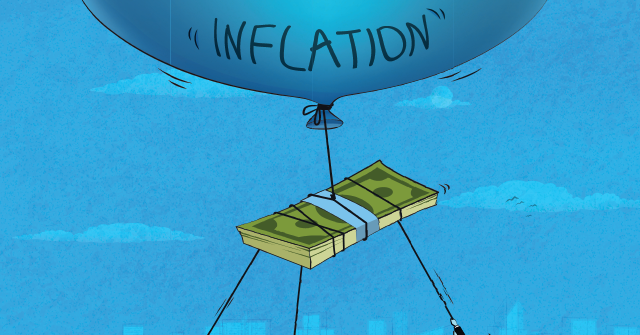The Boston Fed’s Weird Theory of Inflation
The Federal Reserve has long maintained that keeping inflation expectations “anchored” is crucial to controlling actual inflation. The doctrine sounds tidy: so long as the public doesn’t expect too much inflation, inflation itself is unlikely to rise sustainably.
A new paper from researchers at the Boston Fed warns those anchors may be slipping. Household inflation expectations, it claims, have surged to levels not seen since the 1970s—signaling a dangerous “de-anchoring” that could fuel another inflation surge. But their warning rests on questionable measurement choices, contradictory data, and a misleading citation of academic research.
In “Why Have Inflation Expectations Surged Recently? A Historical Perspective,” Philippe Andrade and Michael Wicklein suggest we’re seeing a replay of the 1970s. Their model tries to explain household inflation expectations using recent moves in “salient prices” like food and gasoline—the items people notice most. Whatever can’t be explained is labeled an “unexplained component,” which they interpret as the kind of de-anchoring that keeps central bankers awake at night.
The result sounds ominous: a 7.5 percentage point “unexplained” jump in expectations this spring that is reminiscent of the late-1970s episode.
Then comes the mechanism. When households expect higher inflation, workers supposedly demand wage hikes to preserve purchasing power. Businesses, facing higher labor costs, raise prices—creating a self-fulfilling spiral. “If, for example, workers expect prices to rise 4 percent in the next year,” the authors write, “they are likely to demand salary increases that will enable them to retain their purchasing power.”
That’s likely to give anyone who’s ever held a job pause. When was the last time you told your boss you needed a raise because you expect inflation to get worse next year? And how do you think that would go?
If the Fed’s theory depends on ordinary workers turning into forward-looking macro strategists and their bosses gently submitting to these forecasts by handing out raises, it could use more proof than the Boston Fed supplies.
Neil Dutta’s Devastating Rebuttal
Renaissance Macro’s Neil Dutta has supplied a devastating critique of the Boston Fed paper.
First, he notes that business expectations remain calm. The Atlanta Fed’s Business Inflation Expectations survey shows businesses’ one-year outlook at 2.3 percent, exactly where it stood a year ago. If households really expected five percent inflation and that translated into price-setting, shouldn’t the companies who are actually setting prices have noticed? “Businesses,” Dutta points out, “have much more of an incentive to get the inflation outlook right,” since their forecasts determine profits, not feelings.
Second, the de-anchoring story collapses under alternative data. Dutta reran the Boston Fed’s model using three consumer surveys. The results swing wildly. With the University of Michigan survey, the model explains 47 percent of the variation, leaving a scary 2.1-point “mystery gap” that the Boston Fed folks read as a potential de-anchoring. Using the Conference Board survey, it explains only 29 percent. Using the New York Fed’s Survey of Consumer Expectations, the gap all but disappears—3.2 percent actual vs. 3.1 percent predicted. In other words, the de-anchoring finding depends entirely on which survey you choose.
Third, the transmission mechanism itself is broken. Wage growth is moderating even as Michigan survey responses stay high. Workers can’t simply conjure raises because they clicked “very concerned” in a survey. They need bargaining power. And in today’s cooling labor market, that power is waning. The “mechanical connection from survey answers to wage pressure,” Dutta writes, “appears tenuous.”
Whose Inflation Expectations Really Matter?
The Boston Fed leans on a 2025 paper by Olivier Coibion and Yuriy Gorodnichenko to justify focusing on household expectations, claiming these have a “stronger influence on businesses’ wage- and price-setting decisions” than professional forecasts.
But the paper says nothing of the sort. Coibion and Gorodnichenko show that household expectations correlate with inflation better than economists’ forecasts—people notice price changes faster than PhDs do—but causation runs elsewhere. The authors find that firms respond to their own expectations when setting prices, not to household expectations. And crucially, they document minimal passthrough from inflation expectations to wage expectations: “A one-percentage-point increase in inflation expectations leads to an increase in expected nominal income of just 0.1 percentage point.”
In other words, the boss doesn’t hand out raises just because his CFO tells him inflation is picking up.
What’s more, they find that even as inflation surged, people’s expectations for their own wages barely budged. There’s no evidence of a wage-price spiral, much less one that starts with unanchored household expectations.
Coibion and Gorodnichenko actually offer a cleaner model: inflation expectations influence inflation mainly through firm price-setting, not through wages. Businesses with sticky prices preemptively mark up when they expect inflation to erode margins, which means the metric that matters isn’t how consumers feel about inflation. It’s what businesses plan to do about it.
And—as Dutta points out—by that measure, expectations remain solidly anchored.
The Boston Fed ends with a dire warning: “With inflation expectations of households and firms being high since the surge … we could very well be in the early stages of a second inflation surge.”
That seems unlikely. Business expectations are stable. Alternative surveys show household expectations tracking recent prices, not predicting future ones. Wage growth is easing as hiring slows. Households may be expecting more inflation; but since you cannot spend expectations, prices are unlikely to rise rapidly.
And while it is true that we still have Jerome “Transitory” Powell to worry about at the Fed for another seven or eight months, he only seems to worry that rates are too high when Democrats are in office. And we can take some assurance from the fact that Joe Biden, whose spending spree set off the last inflationary surge, is busy eating ice cream somewhere in Delaware.
Read the full article here
